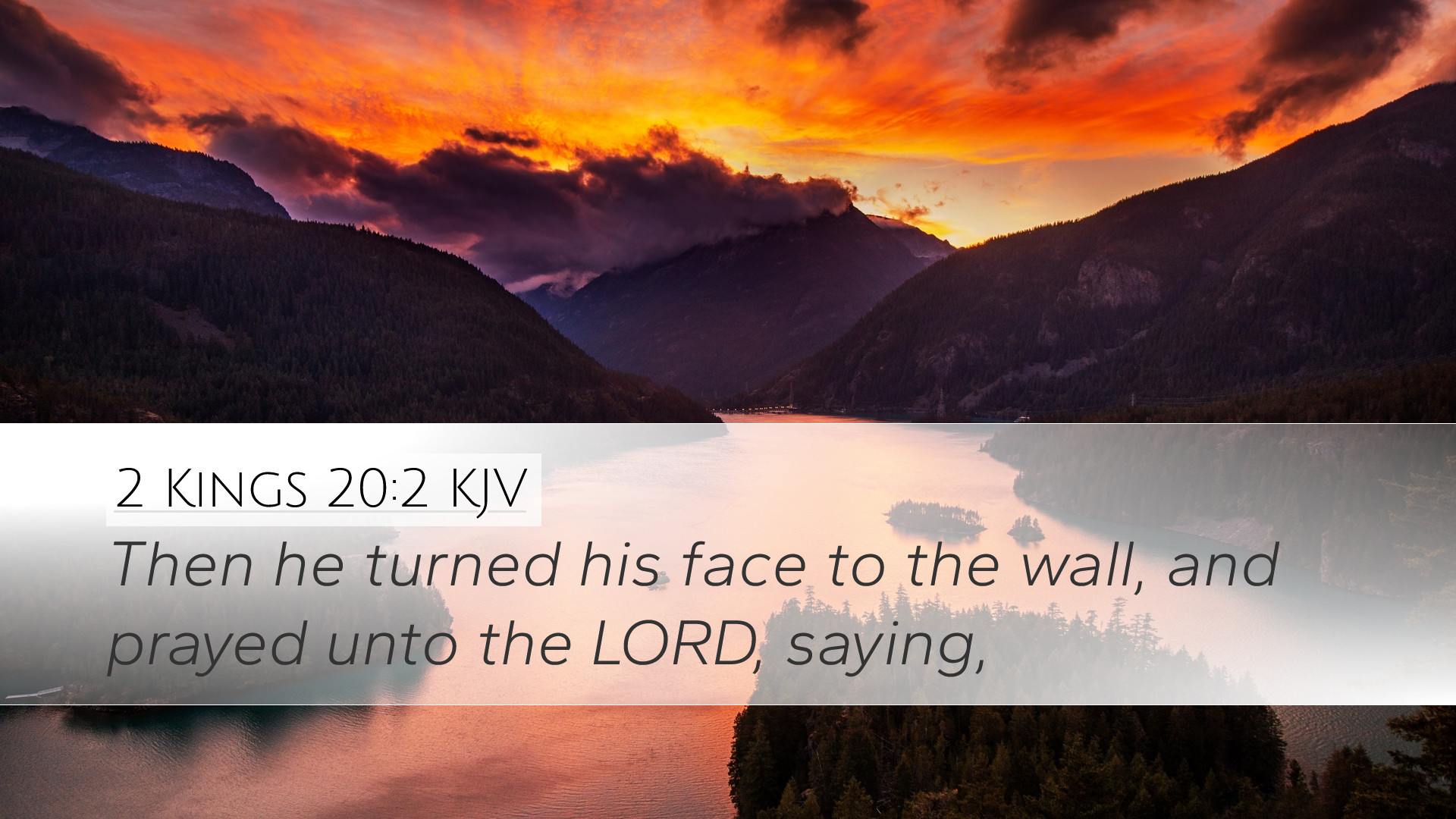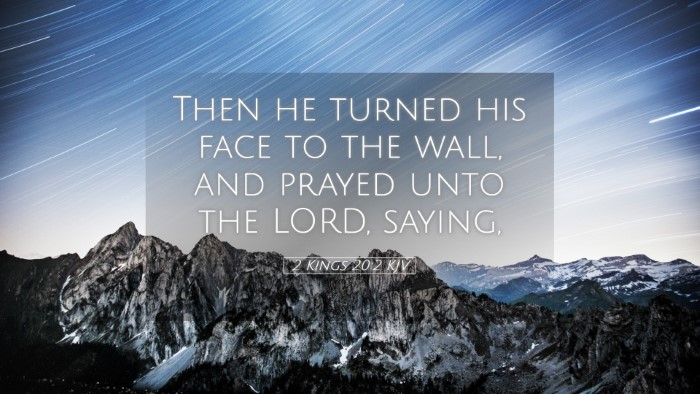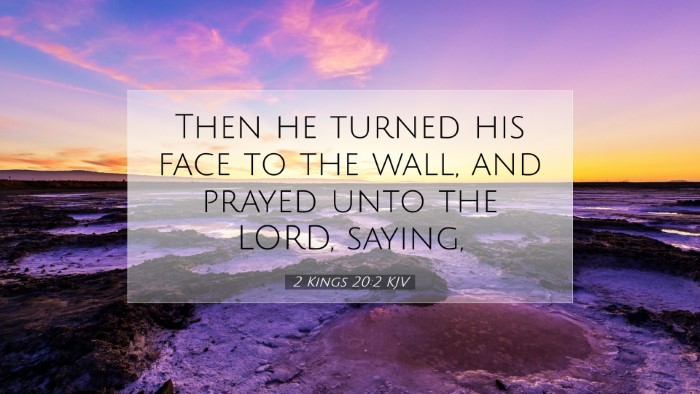Old Testament
Genesis Exodus Leviticus Numbers Deuteronomy Joshua Judges Ruth 1 Samuel 2 Samuel 1 Kings 2 Kings 1 Chronicles 2 Chronicles Ezra Nehemiah Esther Job Psalms Proverbs Ecclesiastes Song of Solomon Isaiah Jeremiah Lamentations Ezekiel Daniel Hosea Joel Amos Obadiah Jonah Micah Nahum Habakkuk Zephaniah Haggai Zechariah Malachi2 Kings 20:2
2 Kings 20:2 KJV
Then he turned his face to the wall, and prayed unto the LORD, saying,
2 Kings 20:2 Bible Commentary
Commentary on 2 Kings 20:2
In 2 Kings 20:2, we encounter a pivotal moment in the reign of King Hezekiah of Judah. This passage highlights Hezekiah's earnest prayer to God following a dire prophecy delivered by the prophet Isaiah. The insights from various public domain commentaries, including those of Matthew Henry, Albert Barnes, and Adam Clarke, provide a rich tapestry of understanding regarding this scripture.
Context and Overview
The historical context surrounding 2 Kings 20:2 is crucial for proper interpretation. Hezekiah’s reign, marked by religious reform and a return to the worship of Yahweh, faced challenges from powerful adversaries such as Assyria. In the opening verses of this chapter, Hezekiah receives a grave message from Isaiah: he must set his house in order because he will die of his illness.
This dire statement prompts Hezekiah to turn to the Lord in prayer, representing his deep-seated dependence on divine mercy.
Hezekiah's Response
The text states, "Then he turned his face to the wall and prayed to the LORD." This physical act symbolizes his complete focus and desperation. According to Matthew Henry, this indicates that Hezekiah was earnestly seeking God’s intervention. His turning to the wall may also signify the intimate nature of his plea; he wished to be undistracted, fully engrossed in conversation with God.
Significance of Prayer and Dependence on God
The prayer of Hezekiah is a model of fervent supplication. He acknowledges God's past faithfulness, saying, "Remember now, O LORD, I pray, how I have walked before You in truth and with a loyal heart, and have done what is good in Your sight." Here, he appeals to God’s covenant loyalty and personal righteousness.
Albert Barnes expounds on this, stating that Hezekiah's appeal is significant as it emphasizes the importance of a righteous life when petitioning God. This highlights a central biblical principle: the relationship between a believer’s conduct and their confidence in prayer.
Theological Implications
The immediate response to Hezekiah's prayer is a demonstration of God's mercy and sovereignty. Isaiah is commanded to return and inform Hezekiah that God has heard his prayer and will add fifteen years to his life. Adam Clarke observes that this reflects the essential truth that God is not indifferent to our struggles; rather, He is deeply involved in the affairs of humanity and responds to heartfelt prayer.
This divine interaction underscores key theological themes:
- The Sovereignty of God: Hezekiah’s life was in God's hands. The initial pronouncement of death and the subsequent reprieve exemplify God’s ultimate authority.
- The Power of Prayer: Hezekiah's prayer is answered, demonstrating that God listens to and can alter the course of events in response to human petition.
- God's Mercy: The narrative showcases God’s compassionate nature. Even in judgment, He provides grace and an extension of life.
Lessons for Believers
For pastors, students, theologians, and biblical scholars, there are several lessons to draw from Hezekiah’s story:
- Intimacy in Prayer: Hezekiah's example challenges believers to approach God with sincerity, especially in times of distress. His act of turning to the wall can inspire personal retreats into prayer.
- Remembering God’s Faithfulness: Reflecting on God's past mercies strengthens faith. In petitions, we should acknowledge what God has done previously in our lives.
- Matter of Life and Death: The urgency in Hezekiah’s prayer emphasizes the seriousness with which we ought to approach God’s throne, especially concerning health and life.
Conclusion
The narrative of 2 Kings 20:2 serves as a profound reminder of God’s responsiveness to those who earnestly seek Him. Hezekiah's prayer reflects the tension between divine sovereignty and human supplication; it invites us to explore the depths of faith and the power of prayer.
The insights from Matthew Henry, Albert Barnes, and Adam Clarke create a cumulative understanding that enriches our comprehension of this text. As faith leaders and scholars study Hezekiah's plea, they are encouraged to foster a culture of earnest prayer and reliance on God's mercy in their communities.


